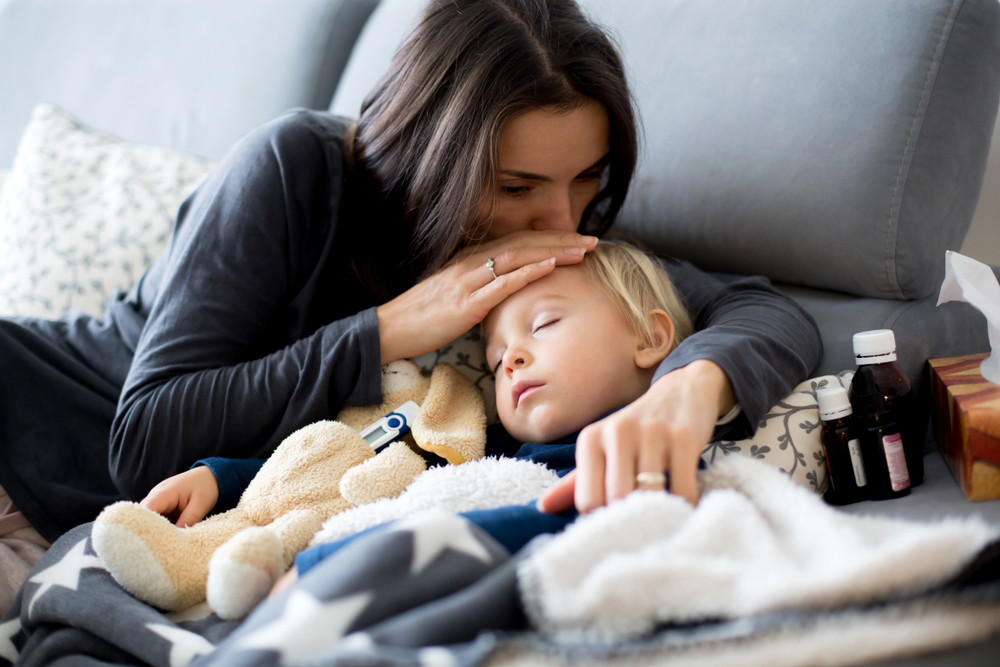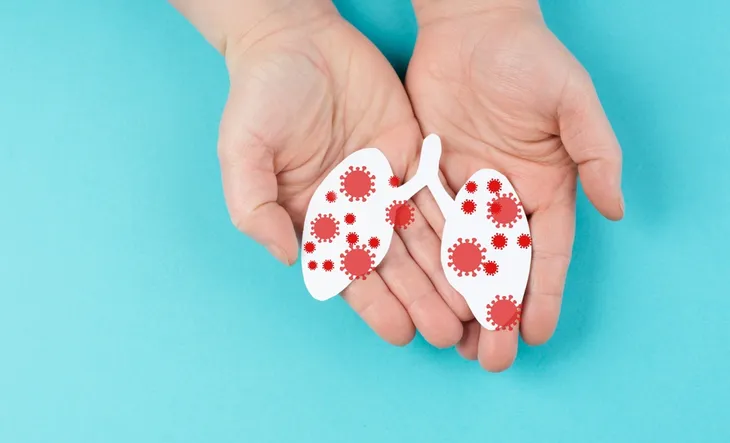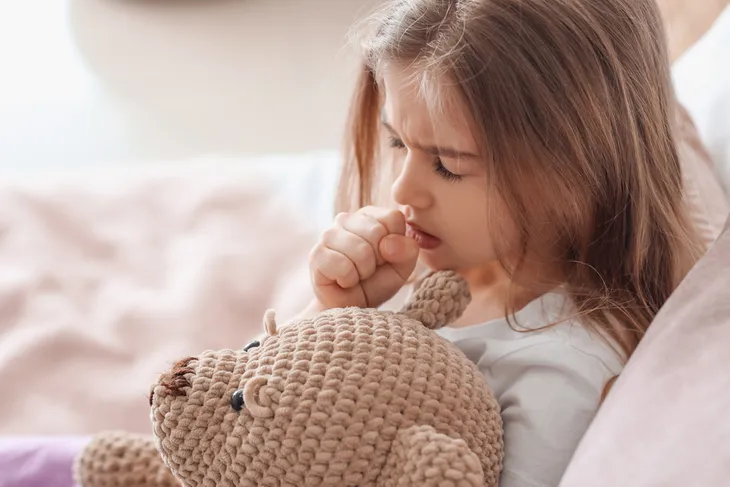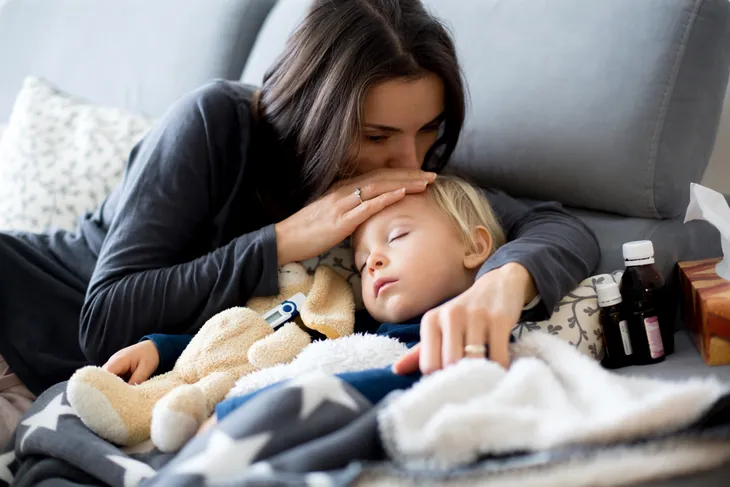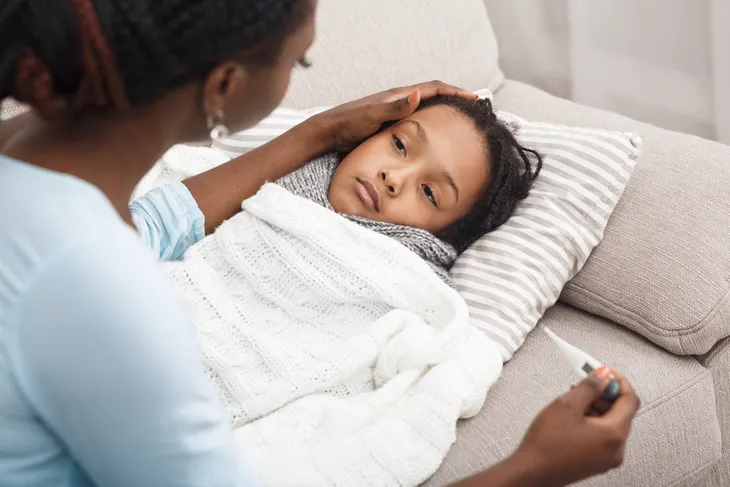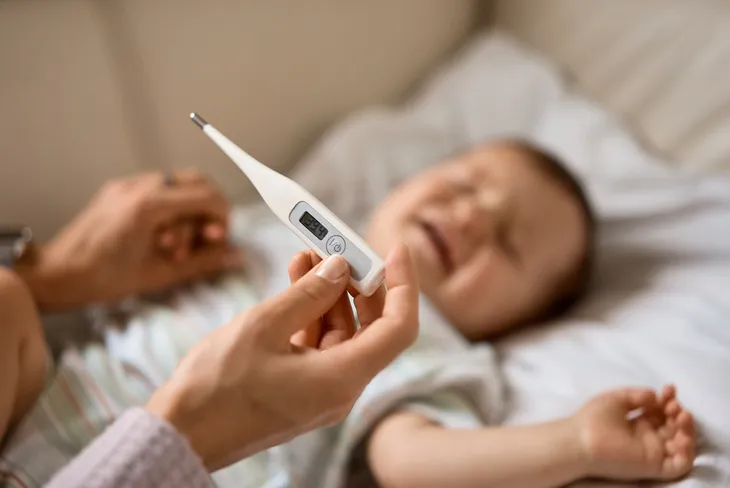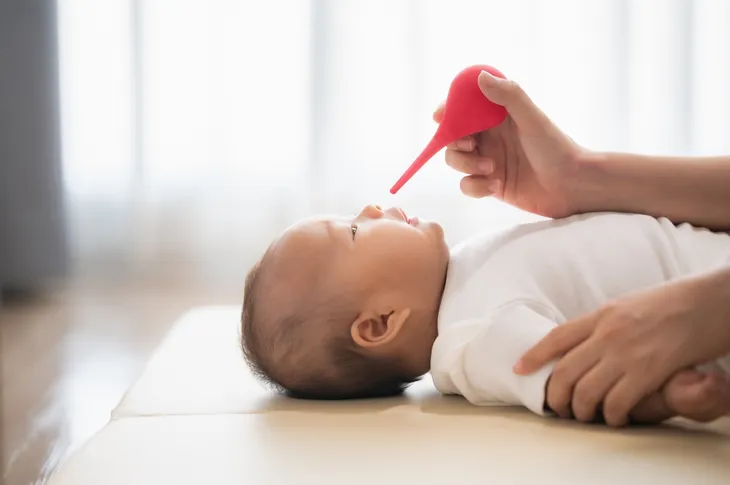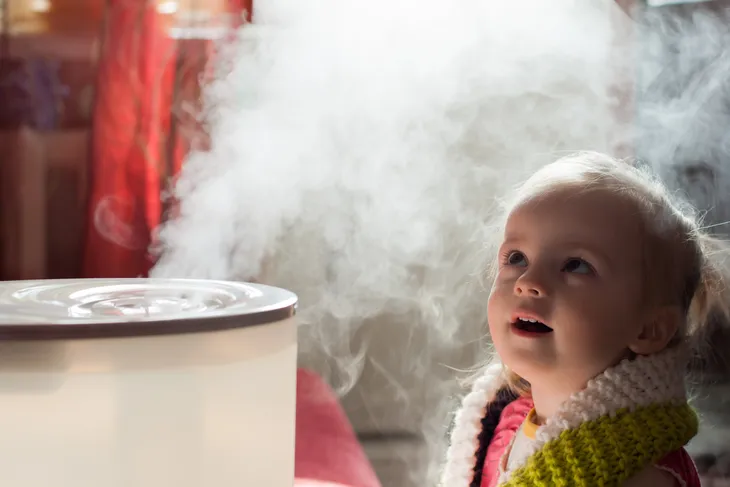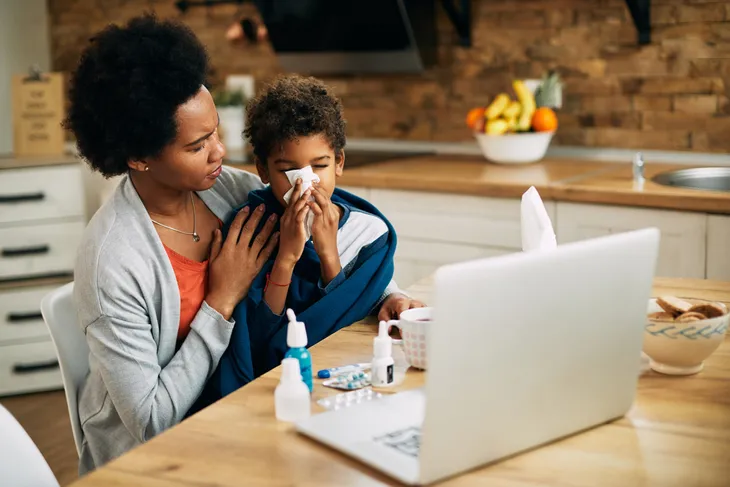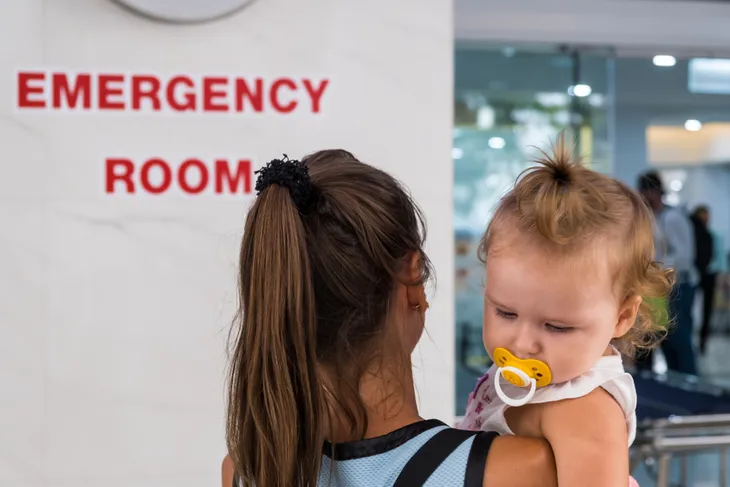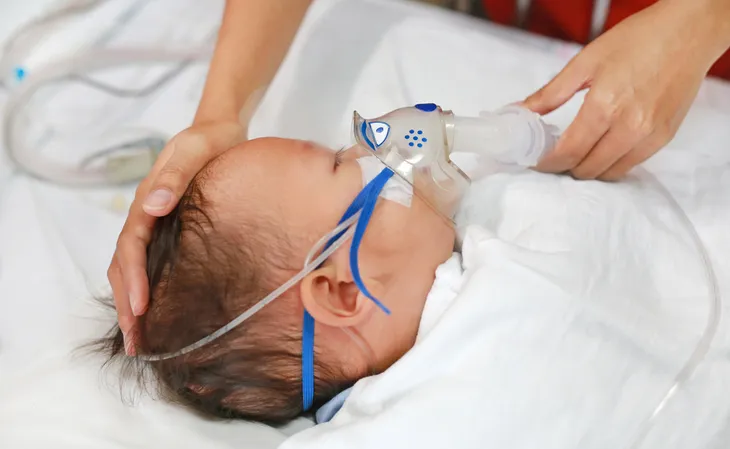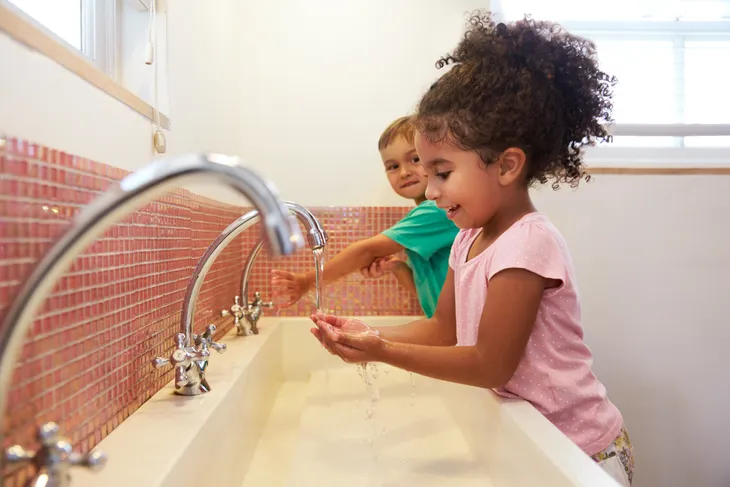- Respiratory syncytial virus (RSV) is a common respiratory virus that targets the lungs, particularly the small air pathways. It’s one of the most frequent causes of childhood illness.
- Most of the time, RSV will resolve on its own within a week or two. This is the case for most healthy adults and kids.
- RSV treatment usually involves at-home care to relieve symptoms (i.e. increased fluids, rest, clearing mucus, managing fevers, and steamy showers or a humidifier).
- Seek emergency care if showing signs of breathing difficulties, fatigue, rapid breathing, chest wall pulling in when breathing, or a blue tinge around the lips or fingernails.
Each winter cold and flu season brings a lot of unwanted viruses and illnesses. One of the most common and potentially threatening is respiratory syncytial virus (RSV). Mild infections in healthy adults and kids aren’t serious, but an infection in infants or people with a weakened immune system can be significant and even life-threatening.
Since RSV is a viral infection, not much can be done in the form of treatment. Antibiotics don’t work on viruses and there is a vaccine available but only to certain populations like the elderly, pregnant women, and infants. Instead, treatment relies on managing symptoms and preventing complications. Here’s a look into some at-home treatments for RSV, and information on when to seek emergency care.
What is RSV?
RSV is a common respiratory virus that targets the lungs, particularly the small air pathways (bronchioles), explains the Cleveland Clinic. It is one of the most frequent causes of childhood illnesses. In fact, the source reports that most children have experienced the virus by the time they are 2-years-old. Adults can also be infected, but it’s often mild.
For most healthy people, the virus is manageable with cold-like symptoms that usually resolve within a week or two. However, infants under 6-months-old, people over 65, those with a compromised immune system, lung disease, or a congenital heart condition are at risk of developing a severe case of RSV. The source warns this can lead to pneumonia or bronchiolitis and require hospitalization.
Symptoms of RSV
Symptoms of RSV typically appear within four to six days after an infection, warns the Centers for Disease Control and Prevention (CDC). When they do appear, they often include a runny nose, decrease in appetite, coughing, sneezing, fever, and wheezing. The source goes on to explain that these symptoms might not appear all at once. And in the case of a small infant, they might only show signs of irritability, decreased activity, and difficulty breathing.
Call 911 or visit the emergency room if a baby or toddler is showing severe symptoms of RSV. These include noisy breathing, flaring (spreading out) of nostrils with every breath, blue or gray color in lips, mouth, or fingernails, belly breathing or “caving in” in the chest in the form of an upside-down “Y,” short, shallow, or rapid breathing, or pauses while breathing.
Basic Treatment
While researchers are working hard to develop a vaccine or antiviral medicine for RSV, the CDC states there is no specific treatment for an RSV infection. Most of the time RSV will go away on its own within a week or two, especially in healthy adults and children. The only thing parents can do is take steps to manage and relieve any potential symptoms.
Supportive care includes over-the-counter (OTC) medicines and taking steps to make a child as comfortable as possible. Speak to a doctor first before giving any medicine to children. If they are having breathing problems, not drinking fluids, or their symptoms are worsening, call a healthcare professional. More severe infections, particularly those in children under the age of 1 or seniors, may require hospitalization.
Rest
The most simple and easiest form of treatment is also one of the most important. Rest, rest, and lots of rest! When a child (and adult) is sick, their immune system is working hard to fight off the virus so they’ll likely feel more tired than usual, says the Cleveland Clinic. Encourage kids to rest when they are tired so their body is able to recover.
Make them as comfortable as possible and minimize physical activity to preserve their energy. “Rest is important,” says family medicine physician Neha Vyas, MD to the source. “Prioritizing sleep, especially when they are ill, will allow for a quicker recovery, so maintain a proper nap and bedtime schedule.”
Plenty of Fluids
When people are sick they often don’t feel like eating or drinking much. Their appetite becomes suppressed at a time when their body needs all the help it can get. There’s not much that can be done to bring a child’s appetite back, but the Cleveland Clinic advises it’s extremely important to keep them well hydrated. This is particularly important if the child is an infant.
There are products on the market that help boost hydration, but in most cases, just water will suffice. “Electrolyte solutions like Pedialyte and Gatorade will help replenish minerals lost in perspiration and illness,” says Dr. Vyas to the Cleveland Clinic. “Soft foods, broth, and soups are also nourishing.”
Manage Their Fever
When a child has a fever it can be a scary experience for a parent. “It’s important to keep an eye on your child’s temperature,” warns Dr. Vyas when talking to the Cleveland Clinic. “Temperatures above 100.4-degrees Fahrenheit (38-degrees Celsius) are concerning and should be brought to the attention of your healthcare professional.”
To help reduce their temperature, first make sure the room is at a comfortable temperature. The source suggests giving them blankets when they are cold and ice packs when they are hot. Most of the time, a fever will break on its own, but if necessary there are OTC fever reducers and medication that can help manage the fever and reduce body aches. Always check with a doctor first to ensure the product is safe for children.
Clear Mucus
Most people deal with a runny nose and some congestion during cold and flu season. However, according to Magna Dias, MD, a Yale Medicine pediatric hospitalist excess mucus production is a good indicator that it’s not just a cold and maybe RSV. “The hallmark of RSV is that it causes a lot of mucus production that causes you to blow your nose more frequently,” says Dr. Dias to Yale Medicine.
Removing this excess mucus from a baby’s mouth or nose will not only improve their breathing but also make it easier for them to eat and drink. If they are unable to blow their nose on their own, Kids Health suggests using saline (saltwater) nose spray or drops or a nasal aspirator (or bulb syringe) to remove any sticky nasal fluid.
Steamy Bathroom or Humidifier
There’s nothing more frustrating than not being able to breathe freely due to congestion. What makes it even worse is that there isn’t much people can do about it until the cold or RSV runs its course. The Cleveland Clinic suggests using a cool mist vaporizer or humidifier. This will thin mucus allowing it to drain more easily and soothe dry breathing passages.
Another remedy that may temporarily help is a steamy shower. “Turn a hot shower on in a closed bathroom and let it fill with steam,” writes Medical News Today. “Steam can help to reduce inflammation in the airways, thin mucus, and make it easier to breathe.”
Why It’s Important to Stay Home
Not only is home likely the most comfortable place for a child or even an adult to be when they have RSV, it’s also the safest place. RSV is a highly contagious virus and anyone who has it is likely contagious anywhere from three to eight days. The Cleveland Clinic warns that some infants or people with a weak immune system might even be able to spread the virus for up to four weeks, even if they have no symptoms!
Just like any other virus, we don’t want to continue to spread it around. Staying home is the best way to limit the spread of RSV. While most adults likely won’t find RSV all that bad, if they spread it to an infant or someone with a weakened immune system, it can lead to bronchiolitis or pneumonia. This is why it’s extremely important that parents keep their child home from school or daycare until symptoms have subsided (this goes for adults – stay home from work and avoid social gatherings).
When to Seek Emergency Care
Even though RSV usually only presents mild cold-like symptoms, it has the potential to become dangerous. This is especially true for young children. According to Medical News Today, parents should see their doctor immediately or seek emergency care if their baby is showing any signs of difficulty breathing. Other severe symptoms include fatigue, rapid breathing, chest wall pulling in when breathing, or a blue tinge around the lips or fingernails.
“Pay attention to your child’s breathing,” says Dr. Vyas to the Cleveland Clinic. “If they’re having to use their neck muscles or their chest muscles to take breaths, or they’re breathing fast, or if their lips seem to look blue, seek medical attention immediately.”
Medical News Today adds that babies should be seen by a doctor if they are not eating or drinking enough, becoming weak or not as active as usual, have cold symptoms that are severe or getting worse, or have a cough that won’t go away.
Complications of RSV
Most healthy adults and kids with RSV will not need to be hospitalized. But it can happen and is more likely to happen in older adults or infants younger than 6-months-old, says the CDC. These hospitalizations are often a result of breathing difficulties or dehydration. “RSV can also cause more severe infections such as bronchiolitis, an inflammation of the small airways in the lung, and pneumonia, an infection of the lungs,” writes the source. RSV is the most common cause of pneumonia and bronchiolitis in children under 1.
The CDC goes on to warn that in the most severe cases of RSV a person may need additional oxygen, IV fluids (if they can’t eat or drink), or intubation (breathing tube inserted through the mouth and down the airway) with a mechanical ventilator to help them breathe. Most of the time hospitalization only lasts a couple of days.
Prevention Tips
Unfortunately, RSV is highly contagious meaning it spreads easily between people. The best way to keep ourselves and our children safe is by following some simple, yet effective prevention tips and getting the RSV vaccine if you’re eligible. These not only help prevent people from contracting RSV but will also limit the spread to others.
Medical News Today advises people to avoid close contact with anyone who is sick (even if it’s just a cold). This means no hugging, kissing, or shaking hands. Parents of newborns should limit the number of people who are touching and interacting with their baby during RSV season. Don’t worry about upsetting friends and family members, it’s about keeping them safe. You should also avoid sharing personal items with others. The source warns that cups, bottles, and toys can all be potential carriers of the virus which can survive on them for hours.
Other tips are to frequently wash your hands with soap and water. If this is not readily available, sanitize with a product that is 60-percent alcohol-based. And avoid touching your face, eyes, mouth, or nose. These are all areas where the virus enters the body.
